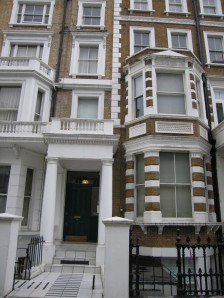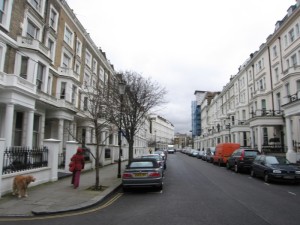Autumn 1966: I began the adventure for which I’d been saving. During the previous year I’d worked as a proofreader and copy editor for Macmillan Publishing Company in Toronto. The year before that I’d graduated from the University of Western Ontario in London, Ontario (Honours English & Philosophy). I was happy to have a job surrounded by books; however, the call of travel overseas was more compelling than that of a career in publishing – particularly because the important, interesting positions were filled by men in those days.
My prospects of advancement were limited to the copy-editing division. Going abroad was far more appealing than continuing to work for $75 a week and living in a boarding house on St. George Street ($10 a week, shared room and shared kitchen).
I crossed the Atlantic on the Cunard liner Franconia, a trip that forms the fictional basis for the short story “Knowing People” in my second collection You Never Know. Arriving in London, I was met by Sheila McCook, with whom I’d become friends at Macmillan’s and with whom I’d formed the plan “to go to Europe”. After a few days in a youth hostel near Victoria Station, we found a bedsitting room on the ground floor at 120 Lexham Gardens (W8), only a block from Earl’s Court tube station. We had no idea at the time that we had stumbled upon classic lodgings for footloose colonials like ourselves: it was only later we began to realize that the accents around us were Australian or Kiwi or exactly like our own.
It was a great room, with a large bow window featuring heavy blue velvet drapes that smelled of stale cigarette smoke. But then almost everything smelled like that in London in the 1960s – the streets, cafes, shops, and the top of the double decker bus where I’d sit smoking my Woodbines on the way to Collingwood Girls School in south London. I’d applied to the Inner London Education Authority and had been sent there as a replacement teacher, not really knowing the first thing about teaching but learning fast, on my feet. I made five pounds a day, which was more than I could have made working as a shopgirl at Harrods’s, as a lot of Canadian girls did in those days. Strange to tell now, 25 pounds a week seemed like a lot of money (in Canadian terms, it was $125).
Sheila and I each had a narrow bed that doubled as settees. There were two armchairs and two dressers for our clothes. There was a sink, but the proper bathroom was up the stairs and always as cold as sin. Baths were not encouraged; we would nevertheless fill the tub from time to time.
Although there was a little hotplate in our room, we mainly ate bread and cheese and in the evening drank vast quantities of cider sitting in front of the gas fire that had to be fed periodically with coins. Before dashing off to work in the morning, I would take a small container of fruit-flavoured yogurt from the window sill where it had remained cool overnight in the folds of the velvet curtains: yoghurt, in 1966, was not yet part of the mainstream food-culture in Toronto, and its tangy taste was part of my excitement at “being elsewhere, not home”. Sometimes we were allowed down to the big kitchen in the basement – a smelly, dark place with ancient equipment – where we would make perfectly awful soup from beef bones.
We did not go out to pubs, as we were saving our money for “the Continent,” to which we crossed by ferry just after New Year’s Day. Our idea of a good time was to walk down to the West London Air Terminal on Cromwell Road, not too far from where we lived; we’d get ourselves a coffee and browse the racks of paperbacks, sometimes allowing ourselves the treat of a new book. It was there I encountered and fell in love with novels by Iris Murdoch and Margaret Drabble; far more importantly, I came upon a fellow Canadian in a lovely little silver-covered paperback titled In Grand Central Station I Sat Down And Wept. I still remember the day of discovery, this writer from Ottawa of whom I’d never heard, Elizabeth Smart…Her lyrical, self-absorbed prose – whatever it was… fiction? memoir? poetry? prose? – broke my heart. Ah, that “printshop boy with armpits like chalices”. I met her once, in her old age, and tried to tell her what she had meant to me, but words failed to convey the intensity of that first reading.
Sheila and I spent five months travelling, hitchhiking, although we did once take a train in Spain. We stopped smoking, as an expense we could not afford (we began again as soon as we were back in London). Often getting lifts from big lorries, we passed from Paris down through the centre of France to the area in which I now live, spending a memorable day at the Pont du Gard (the basis for my first published short story, in Event magazine in the early 1970s). In Spain we met Melodie Corrigall, with whom we rented a flat in Marbella for a month (for 100 pounds). From there, on a whim, we went to Gibraltar, where we acquired the necessary documents and crossed over to Morocco, continuing through Algeria to Tunisia.…Three weeks of marvellously unanticipated adventure.
Remarkable by today’s standards, at the time it seemed normal to stand on the roadside with our thumbs out. We never encountered anything but kindly generosity from everyone who picked us up. By April we’d left Sicily and Italy behind and were in Greece, where youth hostel wisdom had it that Crete was the place to go. So we went, and indeed, it was heavenly. We ended up in the village of Timbaki on the south coast, where I worked in the fairly primitive local restaurant, serving food and washing dishes; Melodie and Sheila got work in the fields picking tomatoes. Eventually we were joined by several others – French, Persian, English, American – and the retsina-fuelled evenings at the little restaurant were ablaze with Greek music and dancing, often made more exciting by leaping contests between Cretan fathers and sons or brothers that included smashed glasses and plates. My job was to count, and add the damage to the cost of the meal.
The junta having taken power that spring in Athens, the atmosphere in Greece became rapidly less pleasant, and we made our way back to England, through what was then Yugoslavia, and Austria, Switzerland, France and over the channel again. As I’d spent my entire stash of $500, it was time to find work, this time teaching Grade One in a primary school near Kennington Oval. We found ourselves another bedsitting room at 25 West Cromwell Road (SW5), much less comfortable than our earlier accommodation, and with the unfortunately sharp odour of urine from the room next to ours where the landlady kept her cats.
As it was summer we hardly spent time in the room; our evenings were out in the pubs and the parks. By that point I knew I would be returning to Canada in October because my mother’s health was poor and my absence was a great worry for her, so I was not ardent in my attempts to save money. And I had enough to live happily in London and still foresee two months of travel once my teaching job finished in July.
This time, I took off on my own, hitching up to Scotland and continuing through the highlands to the Outer Hebrides, from where my mother’s ancestors had come to Canada in 1852, settling on the shores of Lake Huron. I found myself a place on a croft on the Isle of Lewis where I helped with farm work – learned how to milk a cow properly – for three weeks. I still count that period as one of the very happiest in my life. After that, down to Oban and travel with an old university friend, Sheila Johnson.
Then I headed over to Ireland, where three weeks went by as quickly as a pint of Guinness as I moved counter-clockwise around the island. I wandered in a cloud of romantic poetry, paying homage to Yeats by taking a bouquet to his grave under Ben Bulben and visiting his tower Ballylee. I carried an alto recorder in my backpack and played melodies to amuse myself while sitting under hedges by the roadside, waiting for the next likely car. I would tell you that I loved travelling alone, but I know it’s also true that I turned 24 in the Dublin youth hostel and I remember playing “Happy birthday to you” wistfully on an old upright piano in the dining hall, hoping someone would take the hint to invite me out for the night. But no one did.
When I arrived back in London, I stayed with my friend Rhoda Barrett, who had a real job with the Ontario travel office, and thus had a real apartment. Just in time for the last week of EXPO in Montreal, I sailed home on the Alexander Pushkin, a Russian liner that was cheap – nine days at sea for the price of six – and fun. Although the seas were rough I stayed upright the entire time on a diet of caviar, borscht, and vodka. I danced my feet off every night with a gorgeous young English engineer named Peter Anning, whom I’ve never seen since. The perfect little shipboard romance to end my year abroad.
©Isabel Huggan
Related:
- Le Mas Blanc Writer’s Retreat
- Isabel Huggan







[…] Huggan’s piece (Footloose) about living in London in 1966 and travelling around the Continent mentioned the West London Air […]
LikeLike
Ah, the travels of youth: hardship seems like adventure and strangers are indeed kind. This story brought back memories of my early travels to Germany and Austria, British Columbia and Alberta. The most important thing was always the girlfriend who accompanied me. Those relationships were so sweet, so close; we talked for hours and expressed our every thought. I still hold those times close to my heart. Thanks Isabel.
LikeLike
Hi Debra
Hello from cold and snowy Guelph.
I’ve been enjoying your posts recently and I have been passing them on to a friend. He would like to get put the Canadian Writer Abroad list but I can’t remember how I originally joined up. Can you sign him up or give us some instructions? His email is
wcheswor@uoguelph.ca
All the best. Steve
LikeLike
Done. The Follow button is in the bottom right hand corner now.
LikeLike
Wonderful! Will have to share this with Emily and Mary. So sad that this just isn’t possible to do any more. I’m thinking that Isabel might have rubbed shoulders with my older brother Allan who was in many of these places over the same two years. He was a bit younger though, straight out of high school…. We’ve got to get ourselves back to the garden….
LikeLike